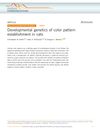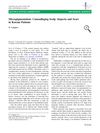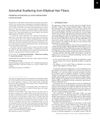 378 citations,
November 2011 in “Human reproduction update”
378 citations,
November 2011 in “Human reproduction update” Experts recommend using evidence-based methods to diagnose and treat hirsutism, focusing on symptoms and underlying causes.
 31 citations,
April 2019 in “Journal of Cutaneous Pathology”
31 citations,
April 2019 in “Journal of Cutaneous Pathology” Hair becomes gray and thin as we age, and while most hair loss in older people is due to genetics, there's a chance for gray hair to regain color under certain conditions.
 20 citations,
September 2021 in “Nature communications”
20 citations,
September 2021 in “Nature communications” Cat color patterns are determined early in development by gene expression and epidermal changes, with the Dickkopf 4 gene playing a crucial role.
[object Object]  5 citations,
April 2022 in “Frontiers in Medicine”
5 citations,
April 2022 in “Frontiers in Medicine” Hair and skin healing involve complex cell interactions controlled by specific molecules and pathways, and hair follicle cells can help repair skin wounds.
3 citations,
January 2023 in “Agronomy” KDML105 bran extract may help with hair growth and prevent hair loss.
1 citations,
January 2023 in “Skin Appendage Disorders” Radiofrequency devices can help remove or grow hair, but more research is needed.
 January 2020 in “Asian journal of applied science and technology”
January 2020 in “Asian journal of applied science and technology” Good nutrition is crucial for health and preventing disease, and supplements can help prevent nutrient deficiencies.

Nanocarriers with plant extracts show promise for safe and effective hair growth treatment.
December 2021 in “Cosmetics”  6 citations,
October 2005 in “Indian Journal of Dermatology”
6 citations,
October 2005 in “Indian Journal of Dermatology” The document discusses male and female pattern hair loss, its diagnosis methods, FDA-approved treatments like finasteride and minoxidil, their side effects, and the role of lifestyle changes.
 1 citations,
June 2023 in “Genes”
1 citations,
June 2023 in “Genes” Hair loss from Alopecia Areata is caused by both genes and environment, with several treatments available but challenges in cost and relapse remain.
[object Object]  December 2024 in “Nutrients”
December 2024 in “Nutrients” Skin, hair, and nail changes can help detect eating disorders early.
 November 2024 in “Journal of Clinical Medicine”
November 2024 in “Journal of Clinical Medicine” The treatment improved hair thickness, shine, and reduced hair loss effectively.
16 citations,
April 2020 in “Dermatology practical & conceptual” Laser treatment can effectively reduce unwanted hair growth, particularly for people with fair skin and dark hair.
October 2022 in “Our Dermatology Online” The Trust tonic is more effective than minoxidil for treating hair loss.
 1 citations,
January 2014 in “Aesthetic Plastic Surgery”
1 citations,
January 2014 in “Aesthetic Plastic Surgery” Tattooing improves appearance of scalp alopecia and scars.
 17 citations,
December 2001 in “Dermatologic therapy”
17 citations,
December 2001 in “Dermatologic therapy” Different treatments for alopecia areata have unpredictable results and varying success rates.
 February 2021 in “IP Indian journal of clinical and experimental dermatology”
February 2021 in “IP Indian journal of clinical and experimental dermatology” A rare non-cancerous tumor that grows like hair was found in an unusual spot, the vulva.
 April 2021 in “Journal of Investigative Dermatology”
April 2021 in “Journal of Investigative Dermatology” An AI photographic device effectively tracked hair growth improvements in women treated for hair loss.
12 citations,
January 2013 in “Indian dermatology online journal” The document reports a unique case of woolly hair with a combination of conditions not previously seen together.
2 citations,
July 2019 in “Indian dermatology online journal” A 17-year-old girl and her brothers have a rare hair condition with long eyelashes, thick eyebrows, and easily pluckable hair.
April 2021 in “The journal of investigative dermatology/Journal of investigative dermatology” Lichen planopilaris in men often affects the scalp, eyebrows, arms, legs, and beard, with many having family members with hair loss.
 16 citations,
April 2017 in “ACM Transactions on Graphics”
16 citations,
April 2017 in “ACM Transactions on Graphics” Light scatters differently from elliptical hair fibers than from circular ones, and a new model better predicts this behavior, especially for shiny highlights.
 14 citations,
January 2004 in “Journal of Biochemical and Molecular Toxicology”
14 citations,
January 2004 in “Journal of Biochemical and Molecular Toxicology” Mustard gas exposure causes hair loss, but treating with N-acetylcysteine can prevent it.
 41 citations,
October 2000 in “Dermatologic clinics”
41 citations,
October 2000 in “Dermatologic clinics” Better hair care products are needed to protect against grooming and chemical damage.
 38 citations,
June 2003 in “Journal of Investigative Dermatology Symposium Proceedings”
38 citations,
June 2003 in “Journal of Investigative Dermatology Symposium Proceedings” Accurate clinical, histological, and genetic methods are key for understanding and treating hair disorders.
 3 citations,
January 2012 in “Wageningen Academic Publishers eBooks”
3 citations,
January 2012 in “Wageningen Academic Publishers eBooks” Hair health depends on various factors and hair loss can significantly affect a person's well-being; understanding hair biology is key for creating effective hair care treatments.
 April 2021 in “The journal of investigative dermatology/Journal of investigative dermatology”
April 2021 in “The journal of investigative dermatology/Journal of investigative dermatology” 6.1% of patients seeking PRP for hair loss had undiagnosed cicatricial alopecia, which PRP cannot treat.
 2 citations,
January 2019 in “Elsevier eBooks”
2 citations,
January 2019 in “Elsevier eBooks” Biotin supplements are unnecessary for most people but may help with certain conditions like biotin deficiency, brittle nails, and some hair loss.
 September 2016 in “Elsevier eBooks”
September 2016 in “Elsevier eBooks” Different types of hair loss in dogs and cats have various causes and treatments, with outcomes ranging from good to uncertain.





















